As a proud electric car owner in the United Kingdom, I have discovered a fantastic way to not only reduce my carbon footprint but also save money on my electric bills. Electric cars are not only efficient and eco-friendly, but they also offer smart savings opportunities that can benefit both your wallet and the environment.
By adopting smart charging practices and making the most of the charging infrastructure, you can optimize your energy usage and unlock significant cost savings. Let me share some valuable tips to help you effectively manage your electric bills while enjoying the benefits of electric cars.
Key Takeaways:
- Electric cars offer an opportunity to save money on electric bills while embracing sustainable transportation.
- Smart charging allows EV owners to charge their cars during off-peak hours, taking advantage of cheaper rates and reducing strain on the grid.
- Setting preferences and using smart meters can enhance the benefits of smart charging.
- Choose the right energy tariff tailored to EV owners to maximize savings.
- Charging infrastructure options are available for home and public charging, with grants and discounts to support installation costs.
Understanding Smart Charging and its Benefits
Smart charging is a game-changer for electric vehicle (EV) owners, offering numerous benefits that go beyond traditional charging methods. By taking advantage of smart charging technology, EV drivers can optimize their charging sessions, reduce costs, and contribute to a more sustainable energy future.
One of the key advantages of smart charging is the ability to charge your EV at times when electricity demand is lower. This can be during off-peak hours, such as at night when most households are consuming less energy. Additionally, smart charging enables EV owners to charge their vehicles when renewable energy sources, like solar or wind power, are abundant on the grid. By aligning charging times with periods of high renewable energy generation, EV owners can reduce their carbon footprint and support the transition to cleaner, greener energy sources.
By shifting charging sessions to off-peak times, EV drivers can also enjoy cost savings on their energy bills. During periods of low demand, electricity providers often offer discounted energy rates. This means that by charging your EV when rates are cheaper, you can significantly reduce your energy consumption costs. On average, EV drivers can save up to £200 a year, and high mileage drivers can save up to £1,000 a year by utilizing smart charging options.
Implementing smart charging is a simple and hassle-free process. EV owners only need a smart chargepoint, which automatically adjusts the charging time based on electricity demand and user preferences. Plugging your EV into a smart chargepoint allows you to enjoy the benefits of smart charging without any additional effort or complicated setups. It’s a convenient solution that maximizes charging efficiency while minimizing energy costs.
In addition to reducing costs and supporting renewable energy, smart charging also plays a crucial role in balancing electricity demand on the grid. By avoiding simultaneous high-demand charging sessions, smart charging helps prevent strain on the grid during peak periods. This ensures a stable and reliable electricity supply for all consumers while maintaining grid stability.
Embracing smart charging technology is a win-win for EV owners and the environment. By utilizing smart charging options, you can optimize your charging experience, save money on your energy bills, and reduce your carbon footprint. It’s a smart and sustainable choice that contributes to a greener future.
Tips for Effective Smart Charging
To make the most out of smart charging, I can offer you some valuable tips and considerations. By optimizing your charging preferences, exploring EV energy tariffs, and utilizing smart meters, you can enhance the benefits of smart charging for your electric vehicle (EV).
1. Set Your Charging Preferences
When utilizing smart charging, take advantage of the ability to set your preferred charging parameters. You can customize the desired charge level, charge-by time, and minimum charge level to optimize your charging experience. By aligning these preferences with your daily routine and energy needs, you can ensure efficient charging without overcharging your EV or wasting electricity.
2. Explore EV Energy Tariffs
Choosing an EV energy tariff tailored to EV owners can provide additional cost savings and optimize your smart charging experience. These specialized tariffs offer lower energy rates during off-peak times, aligning with the times when smart charging is most beneficial. By accessing cheaper energy rates, you can maximize the financial advantages of smart charging and further reduce your overall electric bills.
3. Utilize Smart Meters
Smart meters are an invaluable tool for EV owners utilizing smart charging. These meters accurately record your energy consumption during cheaper tariff periods, providing you with real-time data on your energy usage. By monitoring your energy consumption, you can track the cost savings achieved through smart charging and make informed decisions regarding your charging patterns and energy usage.
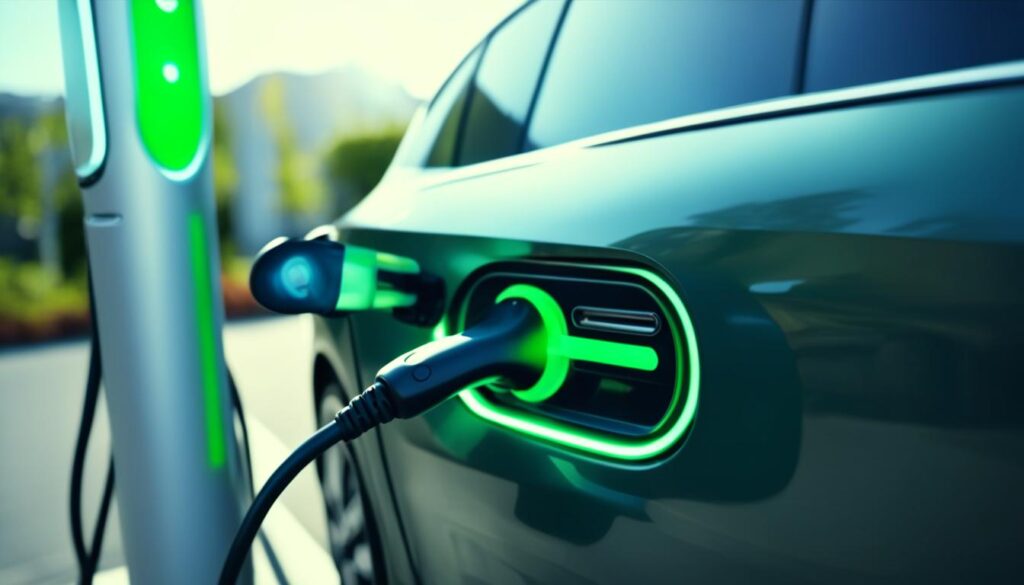
It is important to note that while smart charging is highly recommended, using standard 3-pin plug sockets for long-term charging should be avoided. These sockets may lead to wiring malfunctions and safety hazards, posing risks to your EV and property. It is always recommended to utilize dedicated EV charging points for long-term charging to ensure safety and efficiency.
Comparing EV Energy Tariffs
| EV Energy Tariff | Features | Benefits |
|---|---|---|
| GreenDrive | Electricity sourced from renewable energy | Reduced carbon footprint and support for clean energy |
| EcoCharge | Off-peak charging rates | Significant cost savings during non-peak hours |
| EcoDrive+ | Free public charging network access | Convenient access to a wide charging infrastructure |
By utilizing these tips and considerations, you can optimize your smart charging experience and unlock the full potential of cost savings and energy efficiency for your electric vehicle.
Understanding Charging Infrastructure and Costs
When it comes to charging your electric car, having the right infrastructure in place is essential. Charging infrastructure refers to the various chargepoints available for electric vehicles (EVs), ranging from low speed to rapid options.
Chargepoint Options
There are different types of chargepoints to suit different charging needs. For long-duration charging at home or in residential areas, low speed and standard chargepoints are ideal. On the other hand, if you need to charge your EV quickly in public locations, fast and rapid chargepoints are more suitable.
Costs
The cost of chargepoints can vary depending on the type and features. Prices for homeowners start at around £900. However, it’s important to consider the long-term savings on energy bills and maintenance costs that electric cars offer.
Installation and Grants
Installing a chargepoint can be made more affordable through grants and financial support. The EV chargepoint grant, for instance, covers up to 75% of the installation costs, making it easier for EV owners to invest in charging infrastructure. Taking advantage of these grants can significantly reduce the upfront costs of installing chargepoints.
Furthermore, EV owners can benefit from discounted electricity tariffs, which offer lower rates during off-peak hours, making the charging process even more cost-effective. In addition to financial incentives, EV owners may also be eligible for exemptions from vehicle excise duty and congestion charges, further reducing their overall costs.
By understanding the charging infrastructure options available, considering the costs, and taking advantage of grants and financial support, EV owners can create a convenient and cost-effective charging setup. This not only benefits their pocketbooks but also contributes to a more sustainable future in terms of transportation.
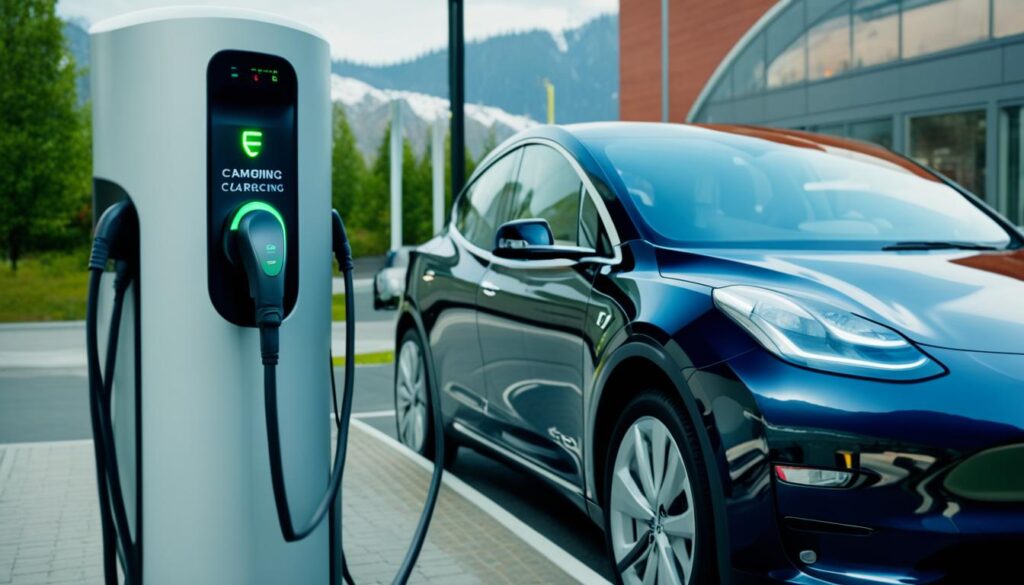
The Environmental Impact of Electric Cars
Electric cars are not only beneficial for reducing our carbon footprint but also for promoting renewable energy and green driving. One of the key advantages of electric vehicles (EVs) is their ability to produce zero emissions when driven, making them a cleaner and more sustainable transportation option.
However, it’s important to consider the source of the electricity used to charge these vehicles. The increasing shift towards renewable energy sources, such as wind, solar, and tidal power, means that the electricity used to charge EVs is becoming greener. By opting for energy tariffs that offer electricity from these green methods, EV owners can further contribute to reducing their carbon footprint and supporting a more sustainable future.
Combining the right type of electric vehicle with an appropriate renewable energy tariff is an effective way to maximize the environmental benefits of EVs. By choosing a green energy tariff, EV owners can ensure that the electricity used to power their vehicles comes from renewable sources, minimizing their overall carbon impact.
It is encouraging to see the rapid growth of renewable energy generation and the increasing integration of electric cars into our transportation system. With continued progress in technology and infrastructure, electric cars have the potential to significantly contribute to the reduction of greenhouse gas emissions and the transition towards a greener, more sustainable future.
The Advantages of Electric Cars for Reducing Carbon Footprint:
- Zero emissions when driven
- Utilize renewable energy sources for charging
- Contribute to reducing overall carbon footprint
The Importance of Choosing a Green Energy Tariff:
- Ensures electricity used to charge EVs comes from renewable sources
- Maximizes the environmental benefits of electric cars
- Supports the transition towards a more sustainable future
“By combining the advancements in electric car technology and the growing availability of renewable energy, we have a unique opportunity to significantly reduce our carbon footprint and create a greener world for future generations.” – Eco-minded EV enthusiast
Comparing Carbon Footprint: Electric vs. Internal Combustion Engine (ICE) Cars
| Vehicle Type | Carbon Emissions per Mile |
|---|---|
| Electric Car | 0 grams |
| Internal Combustion Engine (ICE) Car | Average of 404 grams |
Embracing a Sustainable and Cost-Effective Future with Electric Cars
Electric cars not only offer a sustainable and eco-friendly mode of transportation but also provide significant cost savings on energy bills. By adopting smart charging practices, leveraging charging infrastructure, and selecting the right energy tariff, electric vehicle (EV) owners can optimize their energy use and unlock substantial savings. With ongoing technological advancements and growing support for electric vehicles, embracing them as a smart and sustainable transportation option will ensure a greener and more cost-effective future.
One of the key advantages of electric cars is their energy efficiency. Unlike conventional cars that rely on fossil fuels, electric cars utilize electricity, which can be generated from renewable sources such as wind or solar power. This not only reduces carbon emissions but also allows EV owners to contribute to the broader goal of sustainable transportation. By aligning their vehicle choice with a green energy tariff, EV owners can further reduce their carbon footprint and actively participate in the shift towards a cleaner and greener environment.
Cost savings are another compelling reason to embrace electric cars. With smart charging practices, EV owners can take advantage of lower electricity rates during off-peak hours, optimizing their charging sessions and reducing energy costs. Additionally, incentives such as grants for charging infrastructure installation and discounted electricity tariffs provide financial benefits for EV owners. These cost-saving opportunities, combined with the long-term savings on fuel and maintenance costs, make electric cars an economically viable choice.
As the world continues to prioritize sustainability and energy efficiency, electric cars are playing a crucial role in shaping the future of transportation. By embracing electric cars and implementing smart charging solutions, individuals can contribute to a sustainable and cost-effective future. With the support of advancements in technology and a growing infrastructure, electric cars are set to revolutionize the way we commute, offering a greener and more affordable alternative for years to come.





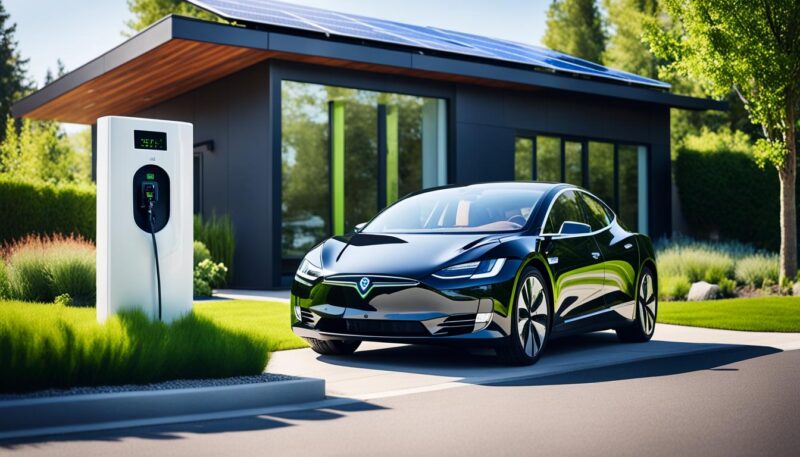
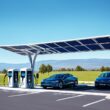

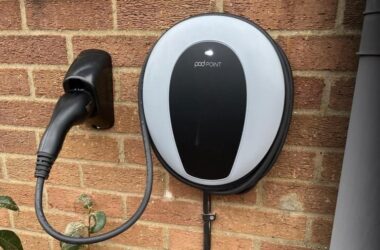
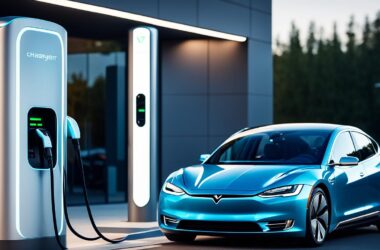
Thanks for your personal marvelous posting! I truly enjoyed reading it, you are a great author.I will be sure to bookmark your blog and may come back in the future. I want to encourage one to continue your great work, have a nice day!
A formidable share, I simply given this onto a colleague who was doing a little analysis on this. And he in fact purchased me breakfast as a result of I found it for him.. smile. So let me reword that: Thnx for the treat! However yeah Thnkx for spending the time to discuss this, I feel strongly about it and love reading extra on this topic. If possible, as you change into expertise, would you thoughts updating your blog with more particulars? It’s extremely useful for me. Huge thumb up for this weblog post!
F*ckin’ tremendous things here. I am very glad to peer your article. Thank you so much and i am having a look ahead to contact you. Will you kindly drop me a mail?
Hello, you used to write wonderful, but the last several posts have been kinda boring… I miss your super writings. Past several posts are just a bit out of track! come on!
I like this post, enjoyed this one thanks for posting.
Simply a smiling visitor here to share the love (:, btw great design and style. “He profits most who serves best.” by Arthur F. Sheldon.
I am now not sure where you are getting your information, but great topic. I must spend some time learning more or figuring out more. Thank you for great info I was on the lookout for this info for my mission.
It is really a nice and useful piece of info. I am happy that you simply shared this helpful information with us. Please stay us informed like this. Thank you for sharing.